NHRE
NATURAL HAZARDS AND RISKS IN STRUCTURAL ENGINEERING
Master of Science (English-language)
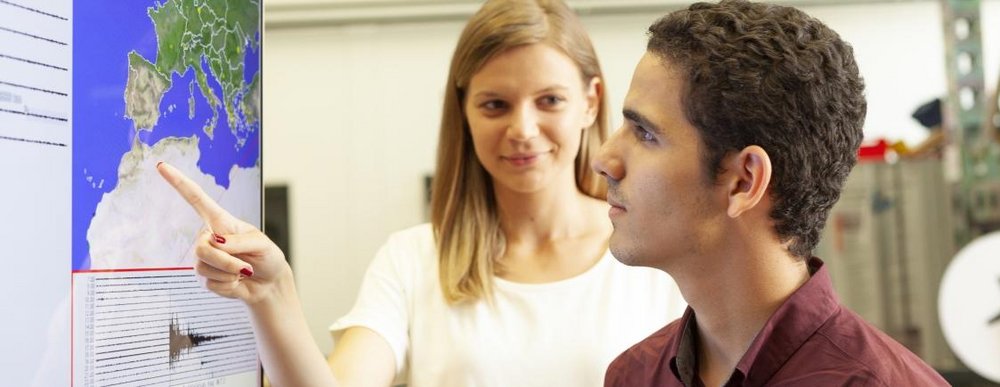

The English-language Master's program »Natural Hazards and Risks in Structural Engineering« (NHRE) is a strongly internationally oriented program that trains students who can perform demanding engineering activities under specific external influences, such as earthquakes. We teach modern tools that can be used to assess natural hazards, enable modeling and simulation, and prepare students to perform concrete risk analyses. Thus, the program offers key qualifications to be innovative and pioneering engineers in the fields of various natural hazards such as earthquakes, floods or storms.
| Degree | Master of Science |
| Duration | 4 semesters standard period of study |
| Field of specialisation | Structural engineering + hazard and risks, Structural Mechanics, Applied Mathematics and informatics |
| Application | Online application by 15 July (without DAAD-EPOS-scholarship) / Online application by 18 October one year before the start of studies (with DAAD-EPOS-scholarship), prerequisite: completed Bachelor of Science / Engineering, proof of English language skills. |
| Start of studies | each winter semester (October) |
The occurrence of an increasing number of natural hazards all over the world and their various effects on individuals, societies and modern economies is one of the major challenges for future decades. The master course in »Natural Hazards and Risks in Structural Engineering« faces this challenge by providing indispensable tools for taking into account those phenomena in the different design processes in civil engineering. Thereby, the master course aims at combining practical structural engineering with state-of-the-art concepts regarding computational mechanics, dynamics and probability theory/stochastic analysis. Consequently, the master course provides key qualifications for innovative work in the field of earthquake, flood and wind engineering and offers an international setting in which students will achieve both technical success and personal advancement.
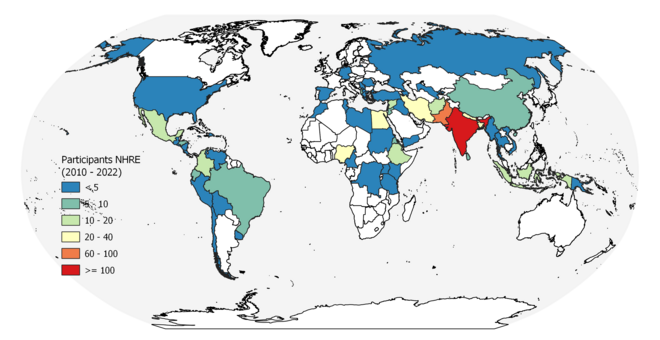
The advanced degree programme is completed after four semesters of standard study time with the degree »Master of Science«. Main areas covered by the master course in »Natural Hazards and Risks in Structural Engineering« are earthquake engineering and structural design, Geo- and hydrotechnical engineering, Finite element methods and structural dynamics, non-linear analysis of structures under extreme loading, stochastics and risk assessment, as well as disaster management and mitigation strategies. The course program covers, thereby, both theoretical and application orientated topics.
The programme is structured as follows (click to enlarge):
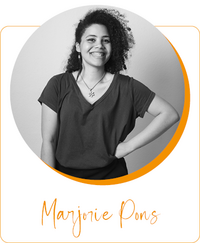
»NHRE allowed me to expand my knowledge in many areas of civil engineering. From learning about different types of structures to natural hazards (and everything in between), I feel that NHRE prepared me in the understanding of both prevention of risks in structures, as well as corrections when damages happen. What I liked the most, though, is that the professors and tutors were very dedicated to teaching us, and I felt supported every step of the way«.
Marjorie Pons
PhD on the use of alternative raw materials for sprayed concrete applications at TU Graz, Austria
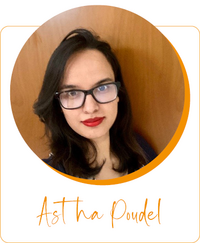
»Embarking on a journey to a new country, with a different culture and on a different continent, can be an intimidating challenge for anyone. However, pursuing my Master of Science degree in Natural Hazards and Risk in Structural Engineering as a DAAD scholar was one of the greatest opportunities of my life. This Master's program is flexible and offers a broad range of specialties to choose from. The various faculties in NHRE were very welcoming and supportive in assisting students in mastering various fields. The classrooms were filled with international students from different countries, providing a diverse and enriching learning experience.«
Astha Poudel
Marie Curie – ITN Fellow
Early-Stage Research (Jointly at Aristotle University of Thessaloniki, and Université Grenoble Alpes)
2016 Batch (DAAD Scholar)
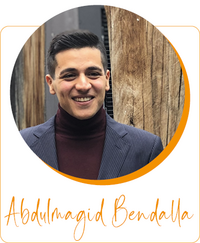
»The NHRE Master's programme at Bauhaus-Universität Weimar offers a rich selection of study modules, each with its own unique research focus. International students have the benefit of tailoring their education, thanks to the flexibility of the programme and the use of English as the language of instruction. They are also able to learn German alongside their studies. For those seeking a more specialised path, the option to choose from a range of elective modules provides a truly personalised experience. I found this programme to be very beneficial in gaining a comprehensive understanding of structural engineering and discovering diverse career options available in Europe.«
Abdulmagid Bendalla (Alumni 2019)
1) The master’s degree programme in »Natural Hazards and Risks in Structural Engineering« is an intensive and application-based advanced course of study. The programme is highly supervised and research- oriented. It provides students a solid technical basis in the key areas of structural engineering through coherent and co-ordinated degree programme, integrating research and practical applications.
(2) The degree programme enables students’ excellence in oral and written skills. By providing students with advanced, scientifically-based, interdisciplinary knowledge, they are able to take on demanding engineering tasks in the areas of planning, construction and realization of structures under specific conditions. They are also able to carry out site- or structure-specific risk analysis using modern tools to estimate the threat of natural hazards.
(3) In addition to strengthening their theoretical and scientific competence, students are able to develop skills in modelling, simulation and application of performance-based design, field work and laboratory investigations.
(4) In order to structure and reflect the complexity of the chain reactions inherent to natural hazards, this programme explores in detail various engineering disciplines and engineering-related areas of the natural sciences, social sciences and economics. It examines the central role that structural engineering plays in reducing the impact of natural disasters. Furthermore, it focuses on the engineering methods that are used to assess and reduce the vulnerability of structures.
(5) The programme highlights the demands on engineering technology at both regional and global level by using international projects as models. The elective compulsory modules expand on specific lines of development; they equip and prepare students systematically for future professional careers or further research positions.
From experience we know: Graduates of our degree programme enter the professional world quickly and successfully. The demand for well-trained civil engineers is still greater than the supply. Take advantage of the opportunity to prepare yourself for a dynamic and exciting professional world in a Master's degree programme at a small and yet internationally oriented faculty.
The Master's degree programme NHRE directly addresses the various regions at risk from natural hazards. The target group of students is mainly located in areas that are affected by annually recurring disasters (e.g. tropical storms and floods) as well as by disasters that occur at irregular intervals (e.g. earthquakes and landslides) (South America, Central and Southeast Asia, Africa). Also addressed are employees of authorities with a connection to disaster management, of engineering companies (planning, construction supervision, support) and of research institutions.
The assignment of graduates is inherently oriented towards the professional sector in their target countries, whereby particular emphasis is placed on engineering practice. Networking with local university institutions is desirable, but not mandatory. At the same time, and currently to a particular extent, the European and German labour market is also open to graduates with the appropriate language skills.

»One of the rewarding aspects of the program for me was the opportunity to work as a tutor for two semesters in the subjects of Geotechnical Engineering and Stochastic and Risk Assessment. This experience gave me a chance to apply the skills and knowledge that I had learned and helped me to further develop my confidence. [...] This experience has been invaluable to my personal growth and has prepared me well for my current pursuit of a PhD jointly at Aristotle University of Thessaloniki, Greece, and Université Grenoble Alpes, France, under the URBASIS Project, funded by the European Commission with an MSCA (Marie Skłodowska-Curie Actions) fellowship.«
Astha Poudel
Marie Curie – ITN Fellow
Early-Stage Research (Jointly at Aristotle University of Thessaloniki, and Université Grenoble Alpes)
2016 Batch (DAAD Scholar)
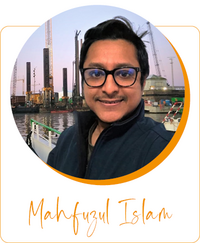
»I liked the structure and the diversity of the NHRE degree programme. The programme was potentially diverse which makes it easier for one to choose a suitable career for oneself. Furthermore, I like that the program includes projects that need computer programming skills. During those project works one gets an extensive experience in different programming skills. I find the experiences gathered in computer programming skills during NHRE program are priceless and help oneself to grow in the further professional environment«.
Mahfuzul Islam
Digital Construction Engineer at Wayss & Freytag Ingenieurbau AG
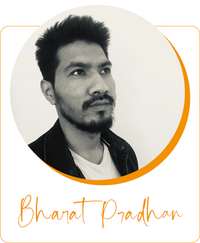
»The M.Sc. program NHRE not only expanded my knowledge in core structural engineering, but also in different dimensions of natural hazards like earthquake, wind and flood. The opportunity to learn from the experts in the field of structural engineering, earthquake engineering, structural dynamics, stochastics, and more was truly unique and invaluable. The courses are blended to improve research skills and projects are facilitated to achieve individual goals. The program's structure is very favorable for job opportunities in Germany and further education as it offers networking opportunities with both industry and academia. I am grateful to have had an easy access to a PhD opportunity in Italy due to the international linkages developed during the two years of the master's program.«
Bharat Pradhan
Structural Engineering Consultant, Co-founder and Chairperson of Pro Eth Pvt. Ltd., Nepal
Lecturer as part-time faculty member at engineering colleges in Nepal
Ph.D. in Structural Engineering, University of Palermo, Italy (2021)
You would like to study at the Faculty of Civil and Environmental Engineering? Here you will find all the important information about the application process. Do you still have questions? Our individual orientation and advisory services offer you the best opportunity to get to know the campus and the city. Try out workshops, visit our laboratories and get advice from students and lecturers!
| Formal requirements | Bachelor degree in Civil Engineering or a related field |
| Language skills | English language proficiency |
| Admission procedure | Enrolment procedure, entrance examination, admission to winter term |
| Application | Online-Application, Deadline: until 15th July without DAAD-scholarship / until 15th October one year before with DAAD-scholarship |
All applicants have to hold a Bachelor degree in Civil Engineering or a related field. The minimum qualification for admission to this programme is normally a »Bachelor of Science« degree in civil engineering or an equivalent university degree, a degree from a college of public administration, or a degree from a government or accredited professional school. The examination committee must ensure that the candidate's prior degree is equivalent to that of the Bachelor's programme in civil engineering. If not, the examination committee may attach additional conditions for admission, which the candidate must meet.
The final grade for the first professionally qualifying »Bachelor of Science« degree should generally be 2.5 (acc. to German system) or better. If the first university degree is not based on a final academic project, the applicant must submit other academic work they have produced.
Language proficiency is an important factor in academic success. Since English is the sole language of instruction at the Graduate School in Structural Engineering, all applicants seeking admission must possess an adequate knowledge of written and spoken English as a prerequisite to admission. Regardless of country of origin or of citizenship status, applicants will be required to provide proof of proficiency in the English language based on one of the two following forms:
Pease note: You can only apply online. The Application deadline for the winter term (beginning in October) is 15th July. If you want to apply for the M.Sc. course on »Natural Hazards and Risks in Structural Engineering (NHRE)« without DAAD scholarship, please apply trough uni-assist: https://www.uni-assist.de/en
You are requested to submit the following application documents to uni-assist only:
All photocopies of documents that need to be included with your application must be legally certified. Legally certified photocopies of documents can be obtained in Germany from sources like, e.g., city halls, district courts or public notaries. Secondary schools and universities are permitted to make legally certified photocopies of their own documents only. In countries outside Germany, legally certified photocopies may be obtained from the German foreign missions or the respective country’s authorities which are authorised to legally certify photocopies. A photocopy of a legally certified photocopy must always be legalized again. You can apply online only. Please do not send documents. Also, do not send original documents, since the university cannot be held responsible for the possible loss or damage of such documents.
The German Academic Exchange Service (DAAD) offers a limited number of scholarships to highly qualified applicants. The current call for applications and necessary application documents for the scholarship for an EPOS study program can be found on the DAAD's website.
Please note: You can only apply online. The enrolment for students of the DAAD scholarship »Postgraduate Courses for Professionals with Relevance to Developing Countries« has to be done until the 15th October the year before. If you want to apply for the M.Sc. course on »Natural Hazards and Risks in Structural Engineering (NHRE)« with a DAAD scholarship, please apply trough the application portal of the Bauhaus-Universität Weimar:
https://weimar.gomovein.com/locallogin/5873933e547cd0744f8b4567/eng
All necessary documents have to be uploaded online until the deadline! You can apply online only. The certified documents have to be presented when you get registered in our university.
If you have any other questions regarding the application process/status, admissions and registration,
please contact Mrs. Theuerkauf at the Student Office.
Weimar is a lively cultural city with an important history: two universities, 19 UNESCO World Heritage Sites, numerous parks, cafés, design shops and great names like Goethe, Schiller and Liszt characterise the cityscape. Even today, the spirit of upheaval and modernity can be felt - at the founding place of classical music, German democracy and Bauhaus, many creative minds come together and actively shape coexistence in numerous student initiatives. Four cinemas, the German National Theatre, several cabarets, more than 20 museums and galleries as well as regular open-air concerts and festivals create a unique flair.
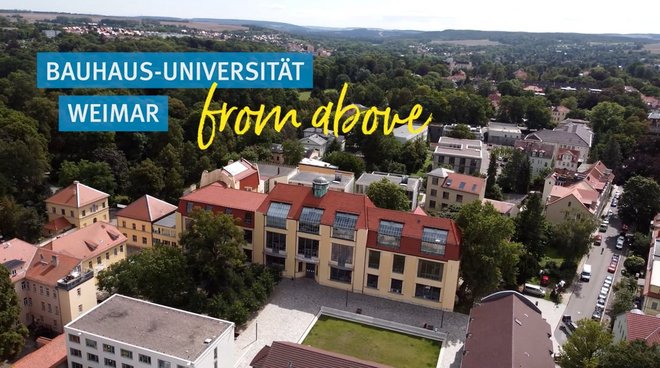
Click the Play button to load and view external content from Vimeo.com.
Automatically load and view external content from Vimeo.com (You can change this setting at any time via our »Data protection policy«.)
The campus of the Bauhaus University Weimar is located in the centre. It takes less than ten minutes to walk to the lecture hall and laboratory buildings, library, refectory, university sports centre, examination office or BAföG office. There is plenty of time for a round of table football in the student house "M18" or a power nap in the nearby shared flat.
The research and teaching facilities of the Faculty of Civil and Environmental Engineering are concentrated in two locations: Most of the laboratories are located in Coudraystraße. Most of the lecture halls, seminar rooms, PC pools and the administration are located in Marienstraße.

»I appreciate the university's friendly environment and assistance in making my stay in Weimar smooth and hassle-free. The city office at Weimar was particularly helpful in matters related to visas and residence permits. Finally, I cannot stress enough the beauty of studying at Bauhaus: making friends from different countries was an incredible experience that enriched my life in ways I couldn't have imagined. I highly recommend the NHRE program at Bauhaus University Weimar to prospective students looking for an exceptional education in natural hazards, risks and structural engineering.«
Bharat Pradhan
Structural Engineering Consultant, Co-founder and Chairperson of Pro Eth Pvt. Ltd., Nepal
Lecturer as part-time faculty member at engineering colleges in Nepal
Ph.D. in Structural Engineering, University of Palermo, Italy (2021)
Changes from color to monochrome mode
contrast active
contrast not active
Changes the background color from white to black
Darkmode active
Darkmode not active
Elements in focus are visually enhanced by an black underlay, while the font is whitened
Feedback active
Feedback not active
Halts animations on the page
Animations active
Animations not active